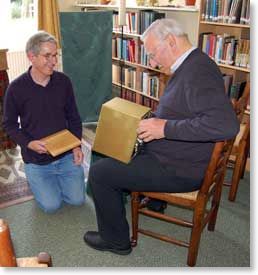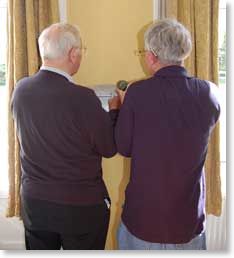31/July/2009 Filed in:
JottingsYesterday the Law Lords decided that the Director of Public Prosecutions should clarify the law on assisted suicide. Inevitably, many hailed the decision as "compassionate" and "a step forward". Surely, no one could be indifferent to the suffering and anguish of those who long for death as a release from something they find intolerable, nor can one be unmoved by the suffering of those who must watch one they love struggle with terminal illness. But we need to be clear about what is at issue. At the moment, assisting another's suicide is illegal. The DPP is being asked to clarify the circumstances in which, for example, a relative who helps someone to commit suicide would not be prosecuted. Advocates of "mercy killing" are right to say this is not the same as permitting euthanasia, that it is a limited measure with limited scope. However, one can see where it is likely to lead, particularly once the language of rights is invoked, as it so often is in the emotive "right to die" argument. So, two points to make. (1) We do not have a right to die, we have no moral claim on death. On the contrary, death has a claim on us. (2) If we do have rights in this matter, then we also have duties. Do we therefore have a duty to die once we are considered a burden to ourselves or others? Who makes the judgement and on what grounds? Catholic teaching on these subjects is remarkably clear and consistent. Living up to its demands is tough but personally I don't want to abdicate responsibility. It's part of being human. And I want to go on being human until I die, which I trust will be at the moment of God's choosing, not mine, nor anyone else's.
30/July/2009 Filed in:
JottingsOne of the great unwritten works of our time is "From Wulstan to Wilberforce: the abolition of the slave trade". St Wulstan (or Wulfstan, if you prefer) was the last Anglo-Saxon bishop of Worcester, the only one to retain his see after the Norman Conquest. He is remembered, among other things, for his valiant opposition to the slave trade. Nearly a thousand years later another Englishman, William Wilberforce, whose anniversary is today, was still battling for the same end. All credit to Wilberforce and his supporters for challenging entrenched attitudes and financial interests. The "churchmanship" of Wulstan and Wilberforce was very different, just as the societies in which they lived were very different, but I can't help feeling they are both united in heaven praying for an end to slavery on earth. For the tragic fact is that a slave trade still exists, and human beings created in the image and likeness of God are still being enslaved. The razzmatazz that surrounded 2007 should not blind us to the fact that much remains to be done.
29/July/2009 Filed in:
JottingsWe keep today as a feast of friendship but we are also reading what St Benedict has to say on the subject of work and lectio divina or prayerful reading (RB 48). I suppose one could identify Martha with the holiness of work, Mary with the holiness of contemplation; but what of Lazarus? According to medieval legend, Lazarus was a sad man to the end of his days because he had glimpsed heaven and been brought back to life on earth. Fanciful it may be, but perhaps we can identify Lazarus with the "divine restlessness" in ourselves, the part of us that is not satisfied with anything less than God. Or again, we can see in the family of Bethany an image of the Blessed Trinity: Julian of Norwich captured the essence of this in her meditation on the nature of the Godhead. Either way, today is a day for celebrating the warmth of human love and friendship and being awed by the friendship God desires to maintain with us.
28/July/2009 Filed in:
Jottings Fr Anthony de Vere and Neville Mason came yesterday to position the tabernacle in our oratory. Neville can be seen kneeling with the beautiful oak plinth he made to match the mensa of our altar (which he also made). Fr Anthony seems to be having trouble with the tabernacle lock, but within minutes the two are hard at work. Very tidy workmen they proved, with Neville detailing Fr Anthony to hold a dustpan while he drills the wall.
Then there is the sanctuary lamp, the gift of Fr Alex Lane, to be fitted. It obviously takes more people to fit a lamp than a light bulb!
Fr Anthony will commission the tabernacle next week. He has enriched our community with many liturgical gifts and left behind a lovely, simple lunette for use here at Hendred. Now, all we await is the Presence.

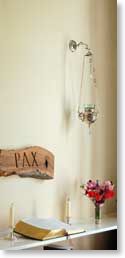
26/July/2009 Filed in:
JottingsSo much for the leisurely Sunday afternoon we had promised ourselves! It merely proves the truth of the old quip, if you want to make God laugh, tell Him your plans. The podcast will have to be done sometime tomorrow after I get back from Oxford — hopefully before Fr Anthony and Neville arrive to fix the tabernacle in position and a guest arrives for a few days. The connection between all that and grandparents may not strike you as obvious, but there is indeed a connection, and it has to do with kindness and the way in which we rely on others. Had today not been Sunday, we would have been celebrating a Memoria of SS Joachim and Anne, the maternal grandparents of the Lord Jesus. Grandparents, as any sane person (i.e. anyone under the age of seven, after which the rot sets in) will tell you, are immensely important people. They are kind, helpful and lavish with the gift of time. When one is young and needs to show off, grandparents can be relied upon to be indulgent. They can be quite good at ignoring parental rules and regulations and often seem to have endless reserves of patience (perhaps because they can wave the grandchiild goodbye at the end of the day, but that's another matter). Parents are too often worried about this and that, especially the future which never comes; but they too know how valuable grandparents are, especially when they need help with childcare as they juggle their busy lives and conflicting commitments. I was thinking about this as I watched a grandparent deal with a fretful child. The stress levels of the parents were visbly mounting and a tug of war looked likely, but the moment Grandma took the child on her lap, all was sweetness and smiles. The bond between the young and the old is very precious. Unless, sadly, they have learned otherwise, the young rely on the old with simple trust and a cheerful expectation of kindness and help; and thankfully, they are not usually disappointed. We may not be grandparents, we may ourselves be very young, but it is worth asking where we fit in this scheme of things. Do we trust, are we trustworthy?
24/July/2009 Filed in:
JottingsToday's chapter of the Rule takes up where chapters 23 to 30 left off and addresses the difficult question of how to restore peace when there has been some rupture or disturbance. It is interesting that Benedict's first suggestion is to ritualize, literally act out in silence, one's sorrow for having offended. Words are not always the best way of making amends. They can easily sound hollow, and the effort sometimes required to speak them can make them sound false or even aggressive to wounded ears. Comparatively few have the gift of being sincere and appearing sincere at the same time, although when one meets such qualities, they are utterly disarming. Perhaps this would be a good day to take stock of any unresolved quarrels/misunderstandings and reflect whether there is some gesture we could make which would lessen the tension and restore harmony. One who seeks to make peace must be prepared for rebuff and failure, however. Grace does not move every heart at the same pace or in the same way. I daresay that even in Benedict's monastery there were some who took a rather mean delight in seeing Brother So-and-So lying with his face on the ground, making satisfaction. Tant pis pour lui.
23/July/2009 Filed in:
JottingsVery much looking forward to James France's lecture on the Cistercians tonight. James lives nearby and is active in the Friends of HTM so opportunities to discuss aspects of Cistercian history are happily frequent. His ground-breaking work on the iconography of St Bernard will be known to some (and was the subject of a memorable "historians' tea" here at Hendred) but tonight's talk will be more general in nature. Benedictines sometimes get a little nervous about Cistercian claims (no wonder, when the Benedictine in the "Dialogue Between a Cluniac and a Cistercian" is so utterly trounced!) but I like to remind people that we stem from the same stock, that many a Black Monk (or nun) has a secret hankering after the more rigorously coenobitic life of the White Monk, and that we have much to learn from one another. For years my myopic gaze looked at the rose window at Stanbrook and saw what I thought was a black sheep and a white by the figure of Our Lady holding the Child Jesus — immensely satisfying to one whose first historical researches were in Cistercian history. Alas, new spectacles revealed that the black and white sheep were a miniaturized ox and donkey. I hope that is not going to prove prophetic of James' theme tonight!
22/July/2009 Filed in:
JottingsToday's feast is a little Easter, full of the joy of the Risen Christ. It's impossible to think of St Mary Magdalene without remembering her running through the darkness in search of her dead Lord and finally seeing him, through a mist of tears, Risen and Glorious, never to die anymore, in a quiet garden. I like to think of that scene suffused with early morning light, the Sun just risen . . . . One thinks also of Julian of Norwich seeing Jesus "in a stained and dirty kirtle", again in a garden. Perhaps the English love of gardens has something to do with this sense that they are a privileged place of meeting. The monastic garden is above all somewhere for prayer and reflection. We all seem to have a favourite corner and a favourite time when we like to be alone in the garden. We don't shoo others away, but we make it quite clear that we need SPACE, please. My times are early morning and evening when no-one else seems to be around. Come to think of it, those are times specially associated with the Resurrection: Mary Magdalene would understand.
20/July/2009 Filed in:
JottingsDigitalnun is pleased to report that Broadband access has now been restored and the new router is a vast improvement on the old (well, so far . . . ) The network within the house has also been tweaked, with a few further refinements necessary (a booster station will be required: has anyone got an Apple Airport Express they would like to sell on? If so, please get in touch.) We hope to get the latest podcast up later today and have set a date of 1 August for implementation of the new blog engine. We'll have a trial period for enabling comments and just see how it goes. As we have often said, there are more useful things to be doing than monitoring unsuitable content! There are a number of changes and additions we want to make to the site but we will give advance warning about feeds and urls, in case we miss some redirects (even Homer nodded). In the meantime, the eco-awareness of today's chapter of RB is something we could all ponder. For Benedictines, the emphasis on asceticism is paramount, but it is also a nice reminder that using daylight rather than artificial light is a fundamental "green" option.
18/July/2009 Filed in:
JottingsThe sixth century monastic diet as advocated by Benedict in today's chapter of RB would not have led to heart disease. In fact, by modern nutritional standards, its emphasis on frugality, regularity, fruit, vegetables and wholegrains, together with the absence of red meat except in case of sickness, would probably recommend it to health professionals. I wonder whether "The Benedict Diet" could become an attractive alternative to all the whacky schemes for so-called "healthy eating" that seem to obsess people in the West? Benedict wanted as much as possible to be sourced locally, from food to clothing (zero food miles, low carbon footprint, he ticks all the right boxes, doesn't he?); there's a long wisdom traditon behind RB; and just enough "mystery" to lend it a certain "otherworldly" charm. Where it might fall down is in its contemporary manifestation. So many monks and nuns are of a "comfortable" shape rather than fashionably slim. No use arguing that that's because most of us don't adhere in every detail to Benedict's principles or do as much manual labour as in the sixth century. Then, too, Benedict's diet would require too much self-discipline to appeal to a celebrity, so I suspect it's a non-starter. We did our shopping yesterday and I couldn't help noticing that some of the food items we bought come a long way from where we live (pasta from Italy, oil from Spain, for example) though I don't think there were any extravagances (conscience not quite clear about some of the items bought for our guests, but that's another matter) and I think Benedict would have approved most of our choices. Digitalnun returned in grumpy mood to find the Broadband "down" yet again, so finally got round to changing the router (the one supplied by BT has caused many headches) and is now muttering about tweaking the wireless network. Internet access is therefore patchy and intermittent while she tweaks and we suspect there is a huge build-up of email on our server. It's rather like cholesterol building up in the arteries . . . .
16/July/2009 Filed in:
JottingsI like the way in which Benedict adds this short, compassionate chapter immediately after his thoughtful treatment of how the sick are to be looked after in the monastery. He expects us to be sympathetic to the weakness of others (which tells us he must have been a kind man himself) but he is aware that authority must protect the vulnerable or there is a risk that we may become harsh or neglectful. Interestingly, he singles out food and the timing of meals as an area of concern. It is easy for a monastery to become a little inflexible: the need for a certain routine can lead to rigidity about what are, in the end, comparative trifles. Happily, I don't think that is likely to happen here. It is a struggle to make ends meet, be faithful to prayer and reading and keep all our charitable works going; so we have learned that we must be ready to adapt and accommodate. The horarium (timetable) of the house provides a structure for the day, but it is precisely that: a structure on which to build, not a cage to constrain or clamp down. Perhaps this would be a good day to take stock of elements in one's life that are meant to support but sometimes weigh heavily. How much do we take on (or impose on others?) that isn't really necessary? The "vulnerable" is, after all, a category that includes all of us at some time or another.
15/July/2009 Filed in:
JottingsThe even tenour of life at the monastery was interrupted yesterday by BBC Oxford, which sent Claire Price to do a small TV feature on us (to be screened on Friday evening, if it survives the editor's cuts). Inevitably, the camera broke down and Claire had to dash away to another appointment sooner than she expected but one has to admire the sheer professionalism of BBC staff. Lugging heavy equipment, falling off a rickety chair in search of a new angle, digesting huge amounts of information in short order and doing apparently "off the cuff" interviews with grace and good humour are all part of a day's work. I'm sure there's the making of a chapter talk in that. Talking of talks, you can now listen to the inaugural lecture in our Trinity Lectures 2009 series, given by Henrietta Leyser on Christina of Markyate, the twelfth century nun. It's on our new
talks page and lasts about 50 minutes. Please bear in mind that it's a live recording to which we did just a little editing, so you can still hear the laughter which greeted some of Henrietta's quips. It is very generous of her to allow us to share her talk in this way so please respect her copyright and get in touch with us if you wish to link to or otherwise make use of her material. As Benedict says, "Do not do to another what you would not want done to yourself." Otherwise Digitalnun will do wicked things with her ht.access file!
14/July/2009 Filed in:
JottingsThe latest news about the spread of Swine 'flu makes grim reading for anyone with a respiratory problem. Apparently, the current virus tends to hit the airways harder, making the development of pneumonia more likely for those at risk. While it remains true that for most people symptoms will be mild and recovery unproblematic, one does wonder why our bishops have still not done anything about suggesting that we stop exchanging handshakes in church, given that hand to hand transmission is so prevalent. My own attempts to replace the handshake with a gracious monastic bow and warm smile have been met with baffled incomprehension and the suspicion that we nuns are being horribly stand-offish. No, people, we're just trying to be prudent as two of us are a bit more at risk of complications than most and it's obvious the poor old NHS is going to be struggling. Oxfordshire is already on red alert and we're still only in July. Perhaps this is something we could all think about. We may be fine about catching 'flu, knowing that the chances of a speedy recovery for ourselves are good; but what about our neighbour? The Kiss of Peace as Kiss of Death? What a horrible thought!
13/July/2009 Filed in:
JottingsAn idle thought. How many abbots nowadays take their turn at kitchen duty? Benedict, as usual, has a point. Every form of service in community is important, and we can be quick to cry off some by pleading the excuse of "more important business", which may mean only something we find more congenial. A medieval kitchen wasn't a very pleasant place to be in summer, nor was kitchen work an easy option, so it is challenging to find Benedict claiming that it increases charity. The question is, in the cook, or towards the cook? If my experience is anything to go by, one sometimes needs a little tin hat to fend off the brethren's not-so-affirmative remarks and one is left feeling that the milk of human charity has turned to yoghurt in one's veins. Perhaps it is all a question of degree. Working in the kitchen provides many opportunities for service, provided one cultivates the right attitude. Love shows in the cooking.
12/July/2009 Filed in:
Jottings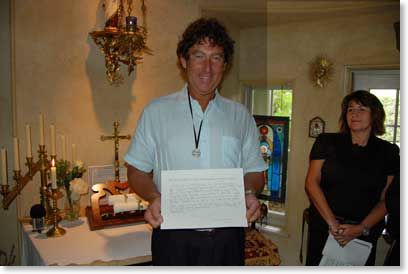
On the Feast of St Benedict Alexander made his final oblation. He is shown here displaying his chart which, just like the monastic profession of vows, is written out by the oblate in his/her own hand, signed on the altar and then laid there while Mass is celebrated. It is a powerful reminder that that we are the living stones of the Church, the true oblata which must be united with the offering of Christ himself. The medal that he is wearing is the medal of St Benedict. Those we give our oblates come from Monte Cassino, where we took care to have them blessed by an English abbot (local patriotism demanded as much). In case you are wondering, Saturday's oblation took place in Alexander's own chapel rather than the monastery oratory: he jetted back from Italy the night before so it was a case of catching him before he took flight again. Fortunately, not all our oblates have to travel quite so much! Today's podcast takes up the theme of what the oblate is and does. There are many ways of being Benedictine. Common to all is the humble, persevering search for God, following the teaching of St Benedict.
11/July/2009 Filed in:
JottingsHappy feast of St Benedict! We don't keep today as a solemnity (that is the "proper" feast of St Benedict, the Transitus on 21 March) but what Benedictine worth her salt would overlook any occasion for rejoicing in our holy father's name? A it happens, we have a stream of visitors booked in this week-end, and today we shall be admitting another oblate; so opportunities for celebrating will not be wanting. In between whiles Digitalnun hopes to finish editing the recording of Henrietta Leyser's superb talk on Christina of Markyate, the first of our Trinity Lectures for this year. Henrietta has graciously given permission for it to be streamed from our web site, so look out for a new TALKS page in the near future. That is where you will also find the community's talks on medieval English mystics and anything else we think worth making available in that format. I can't end this post, however, without drawing your attention to today's chapter of the Rule, 33. Benedict was very severe on private ownership. He saw it as corrupting of community life and insisted that all things should be held in common. Those of us who dwell in monasteries know how easy it is to become attached to this or that, to treat the common property of the monastery as our own; but there is another form of private ownership that we tend to ignore or not take seriously although it can be a great disturber of the peace. We become very attached to our particular way of doing things, of asserting (non-existent) rights over the way in which the community acts or does things. It can even be in trivial matters like how the vegetables are cooked for dinner! Dare I say, it isn't only monks and nuns who fall victim to this? This is a good day to examine how far we demand that others adhere to our standards or adapt themselves to our likes and dislikes. Benedict's ideal of monastic life was to prefer nothing whatever to Christ, to outdo one another in paying respect, to choose always what is better for the other. That's not a bad standard for family life, too.
09/July/2009 Filed in:
Jottings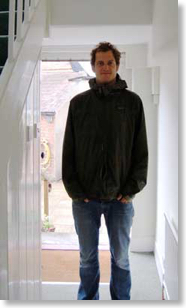
"What To Eat Now" came to Hendred on Tuesday in the shape of Valentine Warner and his team who filmed part of the current series here in the monastery, beginning with Mass in the oratory which, as readers of Colophon will appreciate, is where all our thinking about food and the rituals of eating actually begins. Filming began at 8.00 a.m. and went on for the next twelve hours as we dodged heavy rainstorms to view the garden, then back into the kitchen for cooking sequences, repeated twice over to ensure suitably luscious close-ups of the food. We were assured that kitchens always look better under TV lights (running off our electricity as Scroogenun observed), which is just as well as the kitchen is "atmospheric" in the extreme since we have still not found time to eliminate the mould and redecorate. We do not have TV ourselves, so we won't be watching the finished programme (probably it'll be part of episode 5 or 6 of the current series) but no doubt someone will tell us what happens. We're not going to reveal what Valentine cooked, but tonight's guest speaker, Henrietta Leyser, will be enjoying something he prepared. So, tonight we'll have a feast of history and food! (The inaugural Trinity Lecture, on Christina of Markyate, takes place tonight at 7.30 p.m. in the King's Manor, East Hendred: entrance via the red gates opposite the Eyston Arms. Admission free.)
06/July/2009 Filed in:
Jottings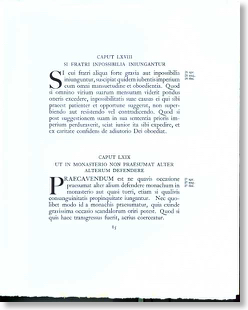
A long time ago I used to give days of recollection entitled "Printing and Prayer". I'd take people through the fascinating history of the Stanbrook Abbey Press, with many an example of fine printing for people to see and hold. Then I'd start to articulate the way in which all the beauty they had enjoyed was a by-product, so to say, of prayer: printing wasn't the purpose of the monastery, although for Benedictines especially, working with words and books has always been a good way of expressing our monastic values. If you think about it, the disciplines involved in printing are quite similar to those needed for a life of prayer. Qualities of honesty and perseverance are necessary for learning any craft; and as with the printer's art, so with the one who prays, simplicity costs. There has to be a stripping away, a glad loss of ego and self-concern. Obedience to the Word is fundamental. Just as the printer thinks as much about the white space on the page as about the words and images that will constitute its contents, so one needs to give some thought to the setting or conditions for prayer. Yes, one can pray anywhere, but it does help to set aside a regular time or choose a particular place, preferably as uncluttered as possible. The colour of a typeface, the differences in black inks, the look, feel and behaviour of different papers, all are taken into account by the printer who knows her stuff. Happily, prayer is a little less complicated and seeks no particular result, so one must not push the analogy too far. The illustration above is telling in its way. It's a page from the Rule of St Benedict that I use every day. It's an imperfect copy of a lectern edition printed at Stanbrook in 1930 on handmade paper (made up of discarded sheets we used as lining paper). The capitals on this sheet are incorrectly placed and some of the word spacing would cause a sharp intake of breath if it were allowed to go forth into the world unadjusted. It reminds me that only God is perfect, that prayer is a gift, given in His way and at a time of His choosing. (Second edition of this post, the first was corrupted on upload.)
05/July/2009 Filed in:
JottingsOur retreat ends today. Our apologies for all the unanswered letters and emails but we do try to limit ourselves to prayer requests and urgent business, otherwise we'd never get a free minute. The concert on Tuesday was excellent. I think Jubilate! sang even better than last year, and there was a very convivial atmosphere in the gardens afterwards. Thanks to some spectacularly generous sponsorship the evening raised £2614, all of which will be devoted to our work for the blind (boring but necessary items like electricity bills, telephone bills, insurance and accountancy fees in the first instance; next, replacing stocks of blank cassettes and labels + a much-needed computer for office work; then we can start thinking about planning for the future. We'll be putting up an equipment list fairly soon, so you'll see how costly many of the items we need are. This is just the start of our fund-raising for St Cecilia's). Meanwhile life in the monastery has not been dull. Wasps decided to build a nest in the library during our retreat: we spotted them on the hottest day of the year, which was fun. Handynun decided to have a mammoth bake-in on the second hottest day of the year, which was also fun, especially for anyone who dared to enter the (admittedly tiny) kitchen while work was in progress; and Digitalnun was heard printing concert programmes at half past midnight on the day of the concert itself, which was . . . fun. At least she had the decency not to sing "Sleepers, awake!" Apparently, she has done something about the blog engine and assures us that from the middle of the month onwards, you will have the opportunity of commenting. The web site will probably be offline for an hour or so while she makes the switch so there will be an announcement when the changeover is to take place. Although our retreat was not quite as leisured or quiet as we might have hoped, we were immensely impressed by the retreat-giver, Fr Jeremy Driscoll OSB, and value very much the input he gave. Probably some of it will appear in this blog over the next few days. There were other joys, too. Walking along some unfamiliar woodland one evening we heard a nightingale singing. It was a heart-stopping moment. The kind of thing that makes every sense come alive with a tremendous affirmation: yes, God, YES.
